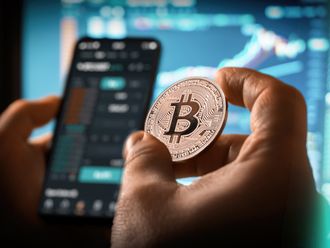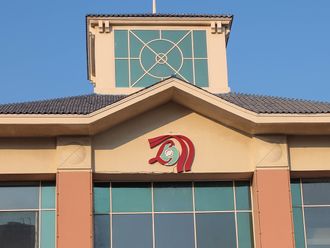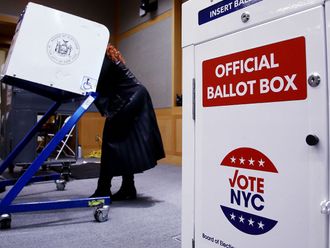Timothy Geithner says US debt is the safest anywhere even after Standard & Poor's yanked away its AAA credit rating. America's bankers in Asia may have a very different take on things.
Asia is sitting on $2.6 trillion (Dh9.55 trillion) of US Treasuries, at a time when one of the official arbiters of creditworthiness has just delivered a vote of reduced confidence. S&P said as much last week when it cut the US's sovereign rating to AA+.
It's time for Asia to figure out how to get beyond this trade, which locks it into buying ever more US debt to keep their own currencies artificially weak.
Here are 10 things Asia leaders need to think about as they try to get to the end of 2011 with their economies intact.
No 1: Weathering a AAA crisis. S&P's move is another acknowledgment that the US is on the path of long-term decline unless it can reverse course. Yet the dollar is, for better or worse, the linchpin of our global system. It forces Asia to confront a remarkable balancing act — figuring out how to reduce dollar holdings without undermining markets and driving down the value of their own investments.
No 2: Double-dip recession. The recent debt-ceiling deal in Washington begins siphoning money out of the US economy at a time when fiscal and monetary stimulus efforts are winding down. Europe, meanwhile, is wrestling with a debt crisis that seems to be spreading from the periphery to the core. Asia proved that it can grow without much help from US and European consumers for two or three years. What about four or five? Asia may have to adjust to life with slower growth.
No 3: The money glut. We live in a world of zero, in which the Federal Reserve, Bank of Japan and European Central Bank are all essentially offering free money. Expect even more liquidity from the Fed, especially if unemployment rises. Economies from Thailand to South Korea worried about hot-money flows and asset bubbles a year ago haven't seen anything yet.
No 4: Europe's meltdown. The US is a sideshow compared with the euro zone. A Greek default seems unavoidable, and so are worsening conditions in Ireland, Portugal and Spain. Yet what should really scare markets is the spectre of an Italian crash. What if Germans grow tired of bailing out Europe's weak links and demand a return to the deutsche mark?
No 5: Deflation, not inflation. Weakening global demand buttresses the view that consumer prices from the US to Singapore will fall. The counterpoint is that liquidity provided by Washington, Tokyo and Frankfurt will make inflation the real risk. Inflation hawks point to gold trading about $1,700 an ounce to support their views. I side with the deflation scenario. Slack demand is the bigger problem.
No 6: IPO bust. Asia has been an obvious initial public offering bright spot in recent years. Expect fewer of them. That means less money for expansion, research, hiring, wage growth and wealth creation.
No 7: Chinese overheating. At the core of Asia's impressive post-Lehman-Brothers performance has been China's 10 per cent growth. China needs it to placate the masses and keep the Communist Party in business. That risks domestic inflation that might roar out of control. Trouble in China is among the last things Asia, or the rest of the world, needs.
No 8: Out of the blue. The unthinkable has an uncanny knack of happening. The list of events that could devastate markets include a Japanese bond-market crash, the "Arab Spring" sweeps through Beijing, an over-the-top provocation from North Korean leader Kim Jong Il, terrorist attacks and firefights in the South China Sea.
No 9: Cooperation deficit. Asia puts on a great show of working together with countless summits, communiques and conference calls. In reality, nations are becoming more inward looking and insular, not only in Asia but globally. It calls into question the whole idea of globalisation. If ever there were a time for policy collaboration, it's now.
No 10: Leadership void. The world economy has rarely been in greater need of credible, savvy and forward-looking policies. Look around the globe. You won't find them in Brussels, Tokyo or Washington. Not Beijing either. If we are heading into Global Financial Crisis 2.0, today's crop of leaders and policy makers sure make me wonder if they are up to the challenge.
William Pesek is a Bloomberg View columnist. The opinions expressed are his own.












